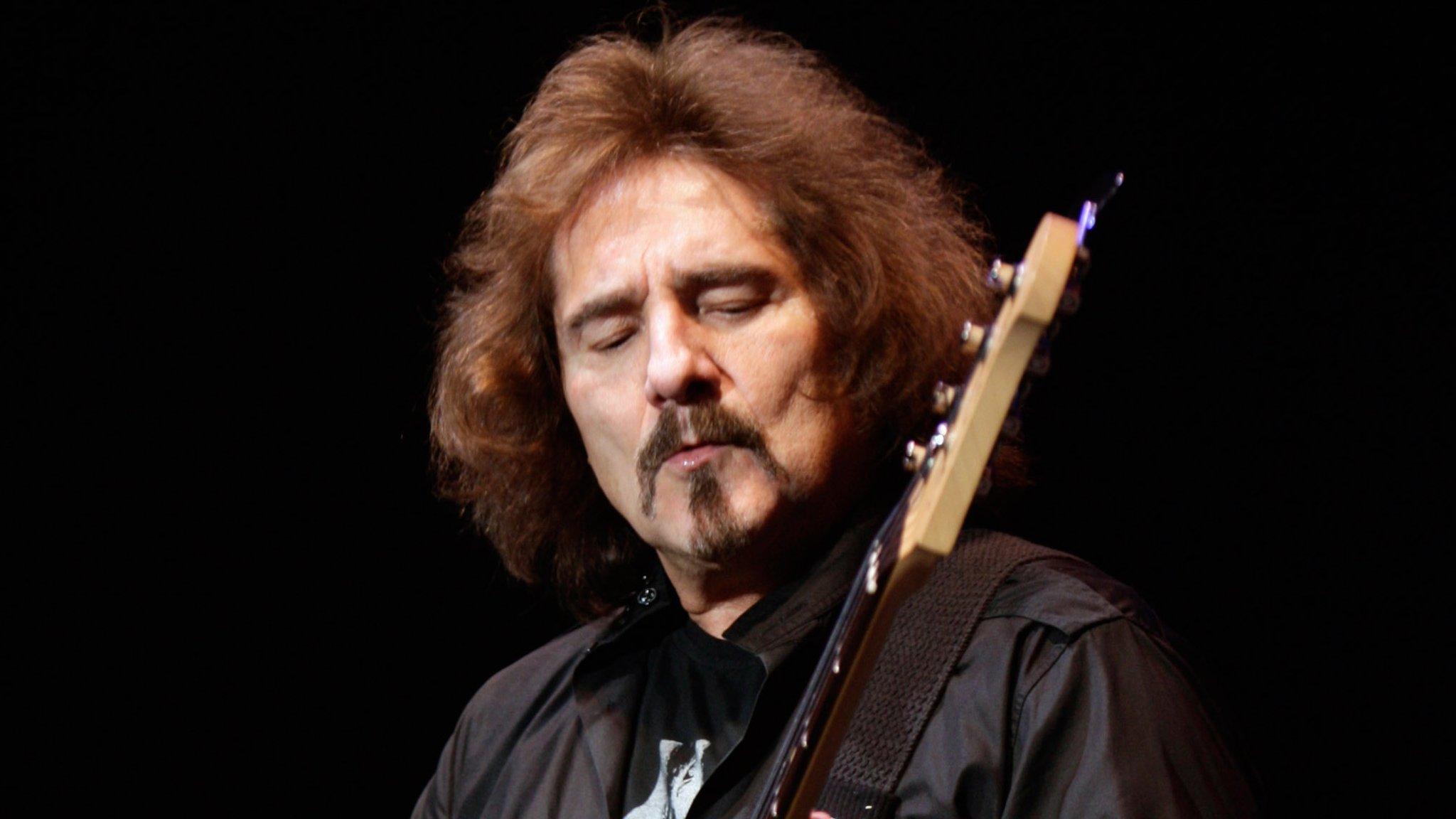Black Sabbath: 'We hated being a heavy metal band'
- Published
The Birmingham street where Black Sabbath's sound began
After several world tours spanning five decades, heavy metal pioneers Black Sabbath are bringing it to a close in the city where it all began. How did Ozzy Osbourne, Tony Iommi, Geezer Butler and former member Bill Ward's upbringing in post-war, industrial Birmingham influence their unique sound - and is this really "the end" for the band?
For a group that has been widely credited with creating the sound of heavy metal, influencing thousands of bands and inspiring generations of guitarists, it was a term Black Sabbath initially wanted to have nothing to do with.
"We called it heavy rock," recalls Iommi. "The term heavy metal came about from a journalist when I came back from America (in the 70s).
"He said 'you're playing heavy metal' and I said 'no, it's heavy rock - what's that?'"
Who coined the phrase is disputed, with Rolling Stone critics Lester Bangs and Mike Saunders both credited with using it first.
Throughout the 1970s, many reviewers used it as an insult - a sneering description of this new wave of "aggressive" musicians, their loud, thrashing sounds reverberating around packed, sweaty rooms full of fans.
Ozzy: 'I'll cry at Black Sabbath finale'
"At first we didn't like being called heavy metal," admits Butler. "But everyone likes to put you into certain pigeon holes, so we sort of got used to it.
"And then instead of it being derogatory, it became a whole lifestyle."
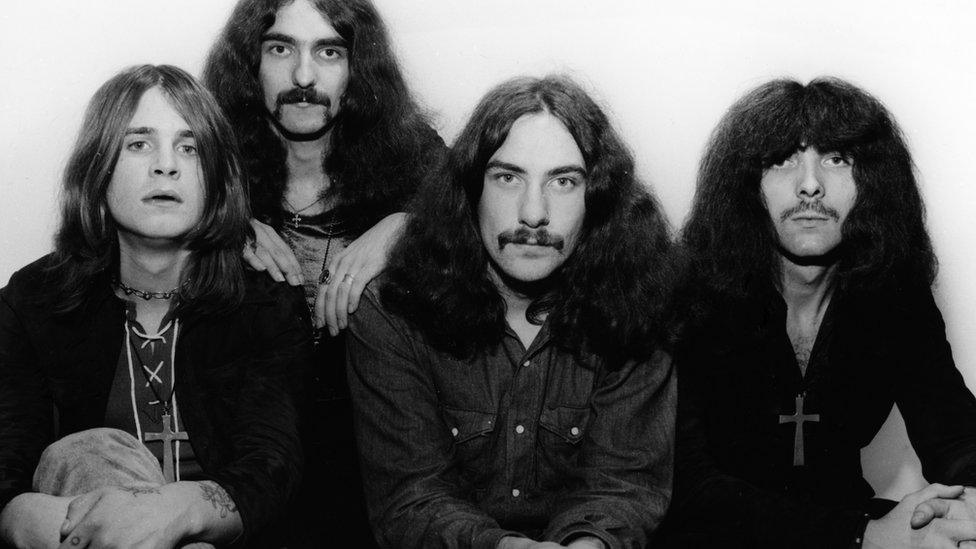
Along with Deep Purple and Led Zeppelin, Black Sabbath were credited with 'inventing' heavy metal
Led Zeppelin and Deep Purple, who, like Black Sabbath, formed in 1968, were also progenitors of the movement.
But Sabbath are credited with inventing the distinctive riffs that characterised the sound in the early days - and that was all down to a terrible twist of fate that befell a 17-year-old Iommi at a steelworks in Aston, Birmingham.
It was the last shift for the young welder at the Summer Lane factory, who was leaving to try and make his fortune as a professional musician.
As he went to cut a piece of metal, the guillotine came crashing down on his right hand, slicing off the tips of his middle and right fingers.
"I was told 'you'll never play again'," says the lead guitarist.
"It was just unbelievable. I sat in the hospital with my hand in this bag and I thought 'that's it - I'm finished'.
"But eventually I thought 'I'm not going to accept that. There must be a way I can play'."
He went home and fashioned new fingertips out of an old Fairy Liquid bottle - "melted it down, got a hot soldering iron and shaped it like a finger" - and cut sections from a leather jacket to cover his new homemade prosthetic.
"It helped to make me play a different style because I couldn't play the conventional way - I couldn't play the proper chords like I could before the accident, so I had to come up with a different way of making a bigger sound."
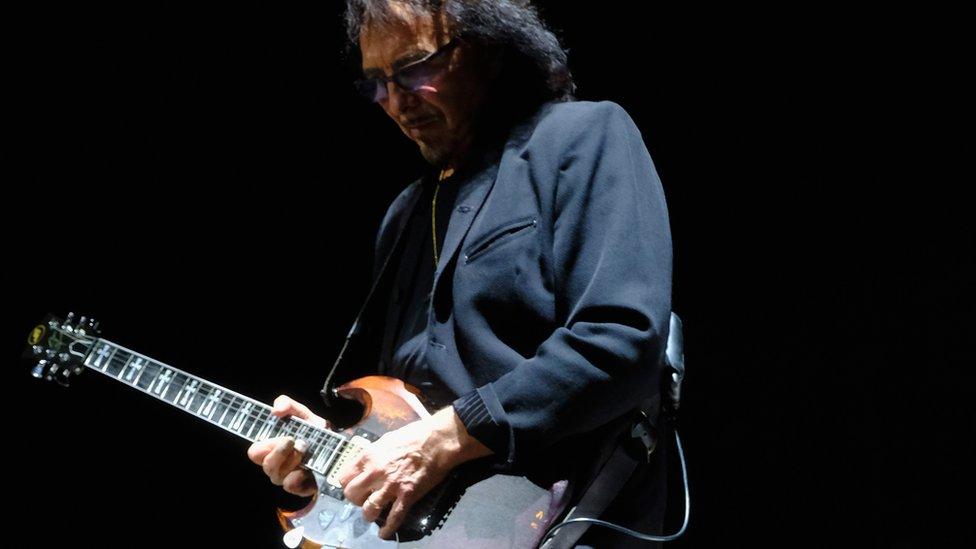
A 17-year-old Iommi fashioned his own prosthetic fingertips to enable him to carry on playing the guitar - the prosthetics he uses today were crafted by professionals
"Tony's an incredible guy," says Osbourne. "He not only played again, he invented a new sound. I often say to him, 'how do you know when you're touching the strings?' - and he says 'I just do it'."
The bleak, factory-laden streets of Aston, where Osbourne, Iommi, Butler and Ward grew up just a few roads apart, also had an impact on Sabbath's haunting sound and ominous lyrics.
The working-class suburb hadn't benefitted from post-war regeneration in the way Birmingham city centre had, just a couple of miles away.
Iommi and Butler worked in factories after leaving school, Ward delivered coal and Osbourne, after stints in a slaughterhouse and car plant, turned his hand to burglary. Music was an escape for the teenagers.
"It wasn't a great place to be at that time," recalls Butler. "We were listening to songs about San Francisco, the hippies were all love and peace and everything.

Within two years of forming their band in Aston, Birmingham, in 1968, Black Sabbath were touring America
"There we were, in Aston, Ozzy was in prison from burgling houses, me and Tony were always in fights with somebody, and Bill, so we had quite a rough upbringing.
"Our music reflected the way we felt."
It was the chance sighting of a small, oddly-written note in a Birmingham music shop - 'Ozzy Zig needs a gig' - that brought the four together.
It was spotted by Iommi and Ward, who were looking for a singer after leaving "a band people could fight to".
"I knew Ozzy from school, Birchfield Road in Perry Barr, and I didn't know he used to sing," remembers Iommi.
"His mum came to the door and we said we were answering the advert, and she said 'John, it's for you'.

The musicians all lived a few streets away from each other in Aston - Osbourne and Iommi used to attend the same school

Ozzy Osbourne said the band "had to finish in Birmingham" where it all began
"I saw him walking up the hallway and I said to Bill, 'forget it'. We talked for a bit and then we left.
"I said, 'I don't think he can sing, I know him from school'."
A few days later, Osbourne and Butler went round to the Iommi family's grocery shop in Aston, saying they were looking for a drummer.
"Bill was with me but he said 'I'm not going to do anything without you'," says Iommi.
"So we said let's give it a go - the four of us."
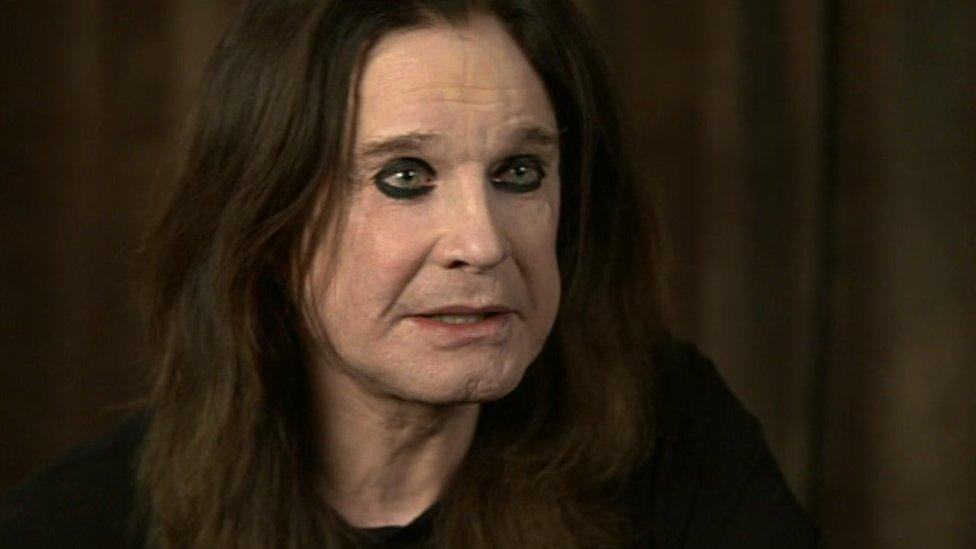
"I have been out of Black Sabbath longer than I've been in," says Ozzy Osbourne
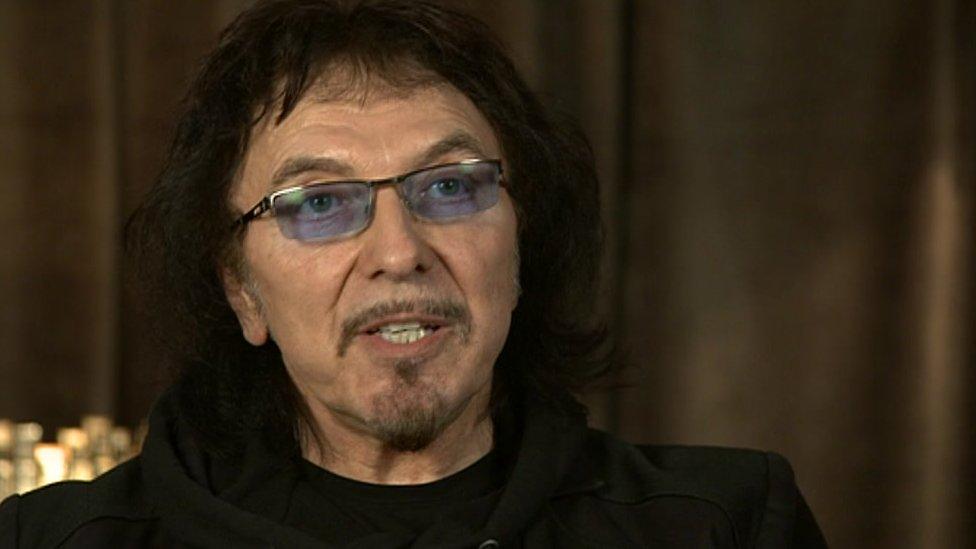
Tony Iommi's much-publicised battle with cancer is among the reasons the band has finally decided to stop touring
Calling themselves Earth, they started out playing blues, before turning their attention to writing their own material.
Butler recalls: "It was always the hippy, happy stuff on the radio and there were we, in Aston, having to go to work in factories.
"We wanted to put how we thought about the world at the time. We didn't want to write happy pop songs. We gave that industrial feeling to it."
And it was Butler and Iommi's love of horror films that gave the group its signature, stirring sound.
"We wanted to create a vibe like you get off horror films - try and create a tension within the music," says Iommi.
"We thought it would be really good to get this sort of vibe, this fear and excitement.
"It was a struggle. There was nothing like what we were doing. We'd taken on something because we believed in it, and loved what we were doing."

Black Sabbath have had many line-ups over the years, with Tony Iommi the only constant presence
Following a mix-up with another band called Earth, the band changed their name to Black Sabbath, after the title track that took its moniker from a 1963 horror film by Boris Karloff.
And within just two years, they were flying to the US to perform to an emerging, global fan base at the start of a career that would span the next 50 years.
Over 70 million records, several line-up changes - Iommi has been the only constant presence - and one headless bat later, the band has decided to call time on touring, performing the last gig on their exhausting 81-date "The End" tour in their home city.
Iommi's much-documented cancer battle and the musicians' advancing years - Osbourne and Iommi are 68 and Butler is 67 - contributed to the decision to slow down.
All three founding members speak with a mixture of pride, excitement and sadness when talking about performing in their beloved Birmingham.
"We've toured everywhere else in the world but there's nowhere like Birmingham," says Butler.
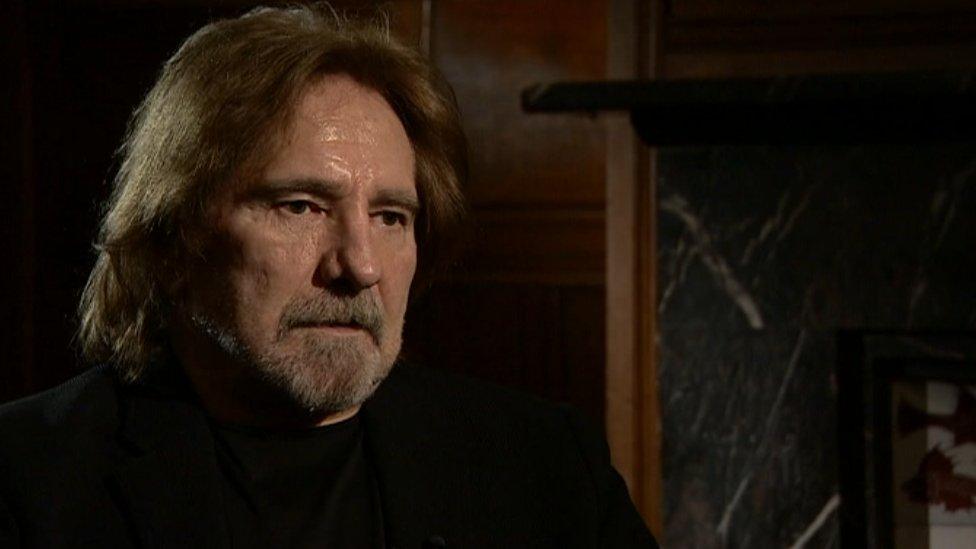
Geezer Butler said the band "came from nothing", growing up on the streets of Aston, Birmingham
"It's still the only place where I get nervous before I go on. It means the world to me. It's where our hearts are."
"It's where we started," adds Osbourne. "The old road has gone back to Birmingham.
"I don't live there any more but most of my family live there. We started in Birmingham so why not finish in Birmingham?"
But, like many bands before them who have announced "the end" before being enticed back on stage with lucrative deals, should we actually expect to see Sabbath back together again one day?
Iommi's certainly keen. "We're not saying goodbye as such, as in we're never going to do it again, [but] we don't want to do any more world tours," he says.
"I wouldn't rule out doing a one-off show. Or even an album. I think the door's open."
Osbourne, however, is resolute.
"As far as I am concerned, this is the end," he insists.
"I have been out of Black Sabbath longer than I've been in. We've all had different arguments and fallings out.
"I don't know about them but I'm not doing it again. We want to end on a high note."
For the full interviews with Black Sabbath, watch Inside Out West Midlands on Monday at 19:30, or on iPlayer.
- Published7 January 2017
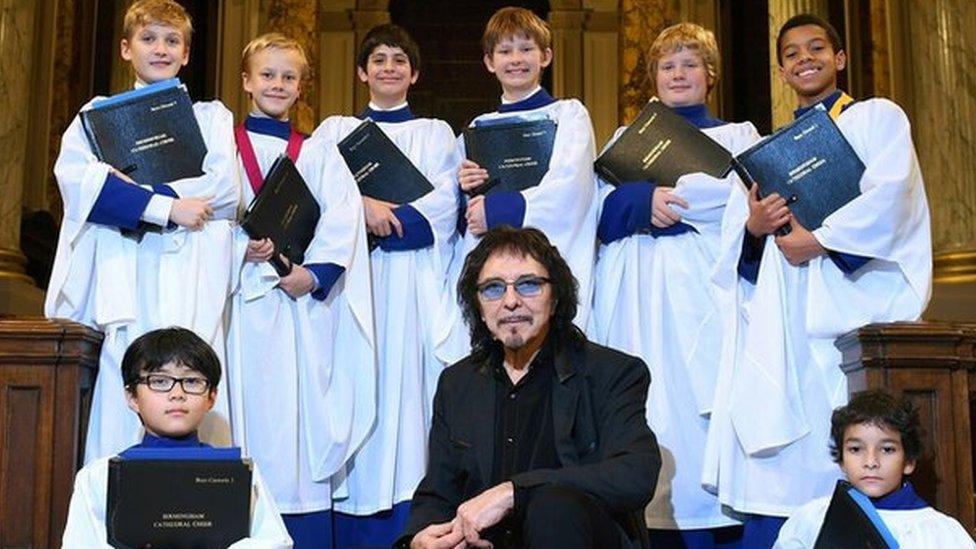
- Published26 August 2015
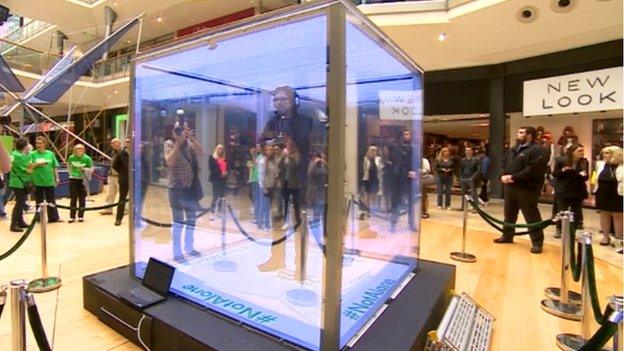
- Published21 May 2015
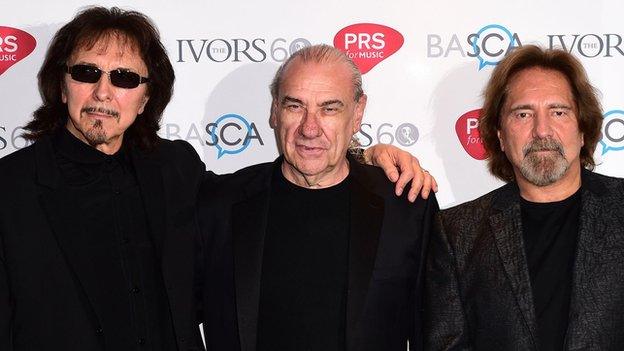
- Published29 January 2015
